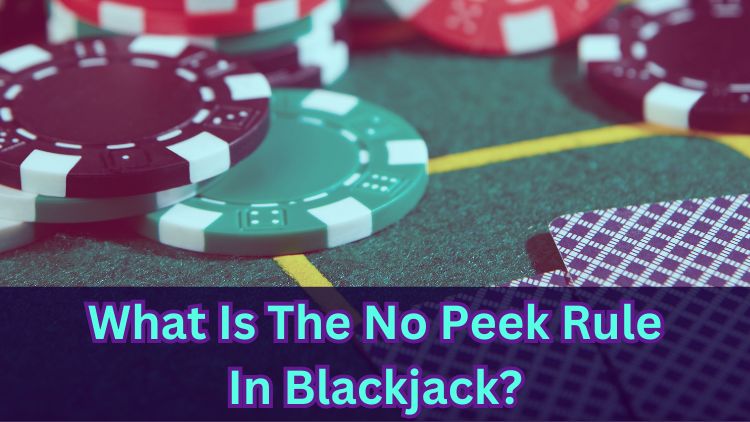
Blackjack is a popular game of strategy and chance that can be found in both physical and online casinos. Those who are curious about the topic may have come across a variety of rules that may change the way the game is played. One such rule is the “No Peek” rule, which can impact how the game unfolds.
Understanding these rules is important for anyone who is looking to play blackjack responsibly by getting to grips with what each rule means. Although it is still a game of chance, knowledge and strategy do come into it to some extent.
In this blog post, we’re going to discuss what the No Peek rule is, as well as how it can influence gameplay. This knowledge can help players make more informed decisions, which can make their blackjack experience more enjoyable overall.
What Is a Peek in Blackjack?
In blackjack, a "peek" refers to when the dealer checks their face-down card if their upcard is an Ace or a 10-value card. This quick check is to see if they have a blackjack, a hand totalling 21 with the two initial cards.
During a peek, the dealer briefly looks at their hidden card to see if they’re holding a blackjack. If they do have a blackjack, the hand is over, and players lose their bets unless they also have a blackjack, ending the game in a tie.
Peeking helps speed up the game by avoiding unnecessary play when the dealer has a blackjack. It’s a practical rule, ensuring that you'll know whether your hand will compete against a strong dealer hand early.
What Does No Peek Mean In Blackjack?
The "No Peek" rule in blackjack refers to a situation where the dealer doesn't check their face-down card until all players have completed their turns. This means players must make decisions on their hands without knowing if the dealer has a blackjack.
With the "No Peek" rule, each player's move is based solely on their own cards and the dealer’s visible card. Only after all players have played their hands will the dealer reveal their hidden card and continue the game.
This rule is commonly found in European-style blackjack games. It adds a layer of unpredictability that can affect strategy since players aren't immediately aware if their hand is going against a dealer's blackjack until the end.
How Does The No Peek Rule Affect Your Chances?
The "No Peek" rule in blackjack can impact your chances during the game, making it an important aspect to consider. This means that the dealer won't look at their face-down card until all players have finished their turns and it is time to reveal it.
Without knowing if the dealer has a blackjack immediately, you might play your hand more conservatively, accounting for this possibility. This can change your strategies, as you won't know immediately if the dealer's hand is so strong until later in the round.
This rule can sometimes lead to players doubling down or splitting hands, only to discover later the dealer has a strong hand. Therefore, it's helpful to be adaptable and prepared with different strategies to handle such scenarios.
What Is a Blackjack Peek Device?
A blackjack peek device is a tool dealers use to check their face-down card for a blackjack discreetly. When the dealer's upcard is an Ace or a 10-value card, the peek device allows a quick check to see if the two cards total 21.
The device ensures the dealer can perform this action smoothly without allowing players to glimpse the hidden card. It usually involves a small mirror or electronic sensor that immediately indicates whether the dealer has a blackjack.
Using a peek device helps maintain the game's flow, as it lets dealers quickly confirm their hand without compromising the game's fairness for the other players. If the dealer has a blackjack, the round can end sooner, saving players and the dealer time.
Understanding the role of a peek device highlights the importance of fairness and efficiency in blackjack. Remember that no strategy or variation guarantees a win and that gambling should always be done for entertainment rather than for financial gain. It’s crucial to always stick to a budget and only bet money you are comfortable losing.
**The information provided in this blog is intended for educational purposes and should not be construed as betting advice or a guarantee of success. Always gamble responsibly.
